Deep Focus: Deadpool 2
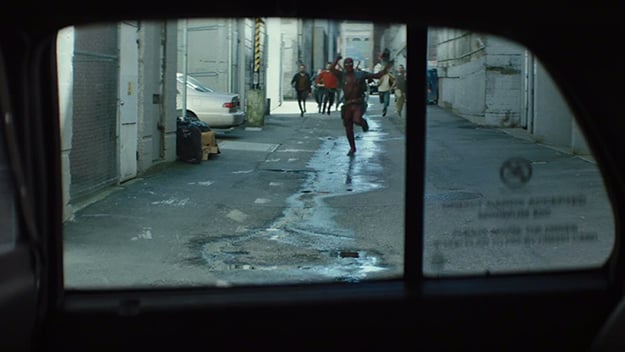
By now it’s accepted that the middle entries in trilogies are the prime meat in the sandwich, but what about the second chapters in duos or franchises? Frequently underrated when they appear, they are often more confident and inventive and as fresh as the originals. I’d take The Adventures of Sherlock Holmes over The Hound of the Baskervilles, Gremlins 2 over Gremlins, Spider-Man 2 over every other Spider-Man.
On a higher level, I’d take Sanjuro over Yojimbo.
On a much lower level, I’d take Deadpool 2 over Deadpool.
A mere two years ago, that witty nihilist Deadpool/Wade Wilson (Ryan Reynolds), the Merc with the Mouth, burst through the fourth wall and 3,558 movie screens—unspeakable and loquacious, unflappable and relentless, and, of course, unkillable. Deadpool was positioned to be the raunchy, irreverent, ultraviolent alternative to PG-13 superheroes. In every quantifiable way, he succeeded. In Deadpool 2, as part of his ongoing talk to the audience about himself, he riffs on having the #1 R-rated hit in international movie history—though in America Mel Gibson’s The Passion of the Christ beat him by a hair and a few thorns.
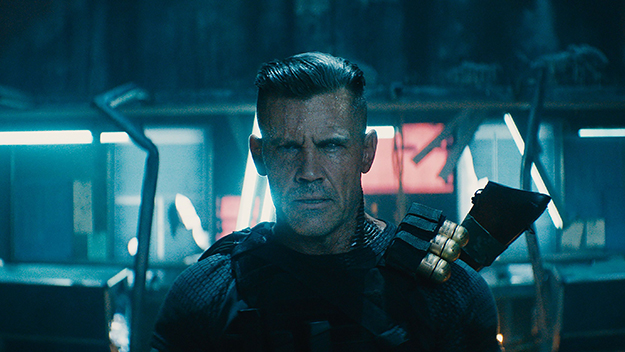
To refresh non-zealots’ memories: in Deadpool, Wilson, a dishonorably discharged Special Forces vet turned hired thug, finds himself ravaged with stage 4 cancer just when he achieves happiness with heart-of-platinum prostitute Vanessa (Morena Baccarin). In an illicit procedure alleged to treat his disease, he gets shot up with a mysterious serum, then tortured in an attempt to wake slumbering mutant genes. The process scars him from head to toe while providing him with super-cells that battle the cancer to a standstill. They also give him the superpower to regenerate everything except, apparently, hair and healthy skin. Calling himself Deadpool (after a mercenary hangout’s “Dead Pool”) and creating a costume that hides his mutilation—red to camouflage blood spatters, straps for blades and guns—he helps the audience predict each element in the origin story before putting a twist on it.
I thought Deadpool was awfully pleased with itself and also both over- and under-written. Intercutting a mammoth shootout with how-we-got-here flashbacks was a flimsy way to spread cool carnage through the film’s first half. The welcome second-half appearances of the righteous, taciturn, metallic Russian X-Man named Colossus (Stefan Kapicic) and his sullen adolescent tutee, Negasonic Teenage Warhead (Brianna Hildebrand), couldn’t redeem the overextended damsel-in-distress climax, which merely tied Vanessa down on a helicarrier instead of railway tracks. Reynolds, a superb pop actor who also serves as one of Deadpool’s writers and producers, got his box-office sensation. But he over-relied on his motormouth virtuosity to carry the show.
Happily, the franchise’s outré ensemble generates livelier rhythms in Deadpool 2: the 119-minute running time, 11 minutes longer, feels shorter. The script gives each supporting character a pick-me-up—a more active or momentous role—even after he or she gets dropped into the cold, cold ground or that otherworldly ether where, according to this film, good comic-book spirits go.
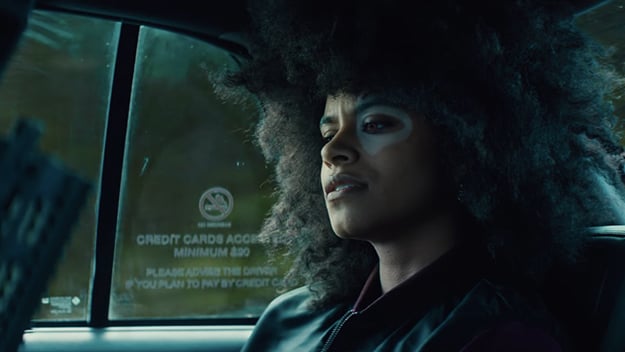
Like the first movie, it’s flip to a fault. It’s also gimmicky, hyper-kinetic, and gleefully self-destructive in its desire to lampoon superheroics and stay exciting. Yet with director David Leitch (Atomic Blonde) taking the reins from Tim Miller, the movie boasts a sardonic visual humor and panache akin to Gareth Evans’s Raid films and the best parts of Phil Lord and Christopher Miller’s LEGO Movie. Even better, our cumulative amusement at Deadpool’s patter and respect for Reynolds’s eagerness and professionalism translate into gnarly affection for his character.
True to the antihero’s taunting spirit, the movie dares us to commit spoilers. Let’s simply say that after a life-altering tragedy and a failed attempt to end it all, Deadpool decides to put his desiccated heart “in the right place.” He doesn’t immediately forsake acts of wholesale slaughter. He does choose to save a flame-throwing 14-year-old mutant, Russell, who’s been abused in a “mutant rehabilitation” center. Julian Dennison, the star of Taika Waititi’s wonderful Hunt for the Wilderpeople (2016), plays him moodily and well. This Russell looks like an angsty adolescent version of Russell the Wilderness Explorer boy in Up.
Just as Colossus and Negasonic Teenage Warhead urge Deadpool to stop killing confirmed villains and even presumed bad guys, Deadpool begs Russell (aka Firefist) to resist committing blazing homicidal vengeance. Unfortunately, for most of the film, Russell distrusts the Regenerating Degenerate.
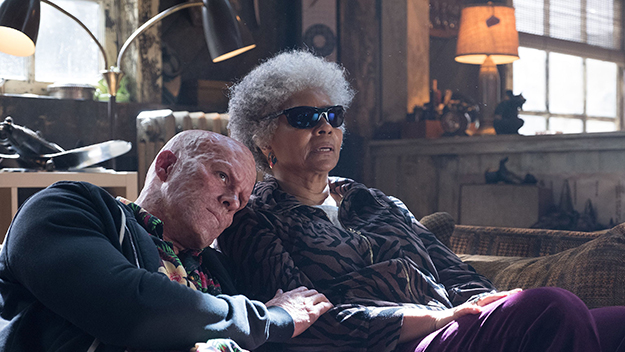
Deadpool must also protect the boy from Cable (Josh Brolin), a super-soldier with a robotic arm who has come for Russell from the future. Never fear: Deadpool won’t let a single cliché pass without putting a spin on it. He demands that Cable provide him with three pieces of knowledge about Earth later in this century: will dubstep still be a thing, what number of Sharknado do we get up to, and have audiences tired of, ahem, mechanical arms?
Why is Deadpool 2 so bloody winning? Chalk it up to Reynolds’s/Deadpool’s adherence to his own waggish sensibility. (The actor now shares on-screen writing credit with the returning Rhett Reese and Paul Wernick.) When he breaks the fourth wall in Deadpool 2, he reassembles it as though a swooping Frank Gehry structure, able to accommodate epic silliness and mad satiric strokes, including shots at Marvel’s competitors. (He asks the all-too-serious Cable, “You sure you’re not from the DC universe?”) This film makes room for quiet time, too, so Deadpool can muse on the jolting similarity between the songs “Papa, Can You Hear Me?” from Yentl and “Do You Want to Build a Snowman?” from Frozen.
The richest jokes go blissfully unstressed. Deadpool and Weasel (T.J. Miller), proprietor of the saloon and mercenary hub called Hell House, conduct job interviews for a super-commando team that are less like the tryouts in The Magnificent Seven than the audition scene in The Producers. Everybody gets in, even a guy who lacks superpowers but liked the ad.
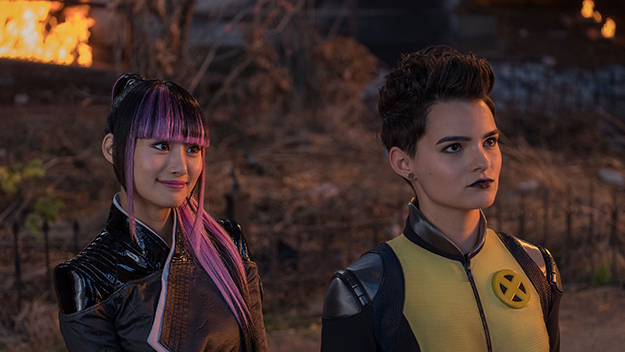
The buoyant Zazie Beetz plays Domino, the most fortunate addition, whose superpower is luck. Deadpool denies that being lucky is a superpower. But Domino and director Leitch prove it when she swings into action, with vehicles tumbling and enemies lining up for her sharp elbows and Ultimate Fighting in unexpectedly serendipitous ways. She’s also lucky enough to be a truth-teller. When Deadpool makes a bogus pronouncement, Domino mutters, “I really should have stayed in college.” When he coins the group name “X-Force,” she asks, “Isn’t that a little derivative?”
That’s cool with Deadpool, whose comic arsenal, like Reynolds’s, includes healthy doses of self-parody. Wielding Deadpool’s Katana blades, he spoofs the way he literally sliced through fusillades in X-Men Origins: Wolverine (2009). Within the jokey framework, Reynolds can be stupendously versatile. He alternates split-second martial-arts moves with loose-limbed slapstick and wins belly laughs by putting odd pauses and inflections into banal lines.
His talent for blather resembles the verbal spritzing of the late Robin Williams. A friend of Pauline Kael’s once told her that Williams’s stand-up act contained “the media outpourings of the past 50 years put into a duck press.” That’s what Reynolds tries to do with comic-book culture in Deadpool. It’s a pity that so many in-jokes refer to superhero movies, but when Reynolds gets a chance to break away, in milliseconds he can neatly meld Winnie the Pooh and Basic Instinct. It’s a miracle he doesn’t end up with any Easter egg on his face.
Michael Sragow is a contributing editor to Film Comment and writes its Deep Focus column. He is a member of the National Society of Film Critics and the Los Angeles Film Critics Association, and a contributor to the Criterion Collection.







